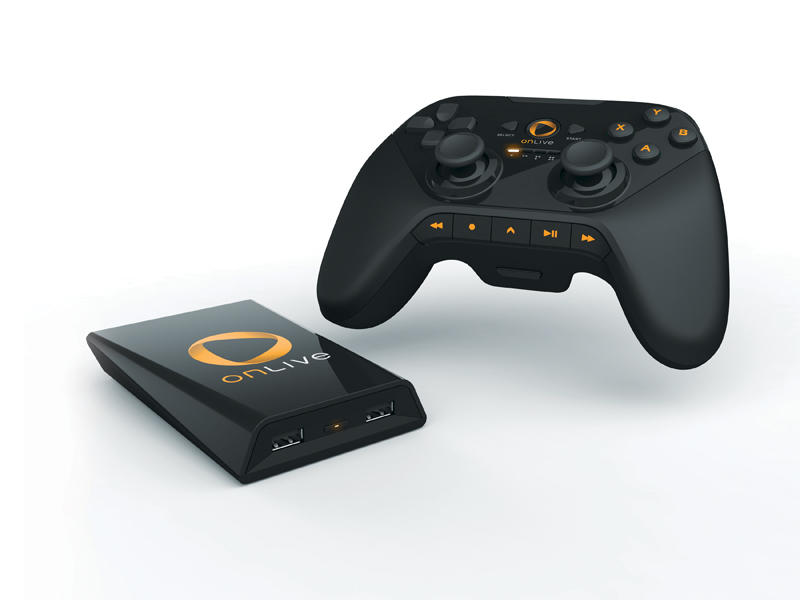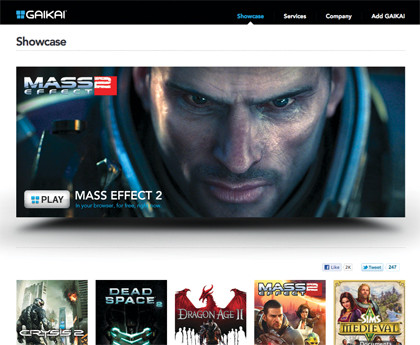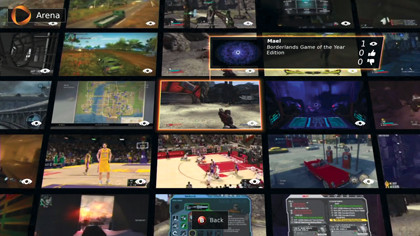OnLive vs Gaikai: cloud gaming explored
Gaikai and OnLive could mean big things for the PC gamer

Sign up for breaking news, reviews, opinion, top tech deals, and more.
You are now subscribed
Your newsletter sign-up was successful
We're not usually in the business of predicting the weather, metaphorical or otherwise. Lately though, the clouds over the current technological landscape have grabbed our attention.
A few got drizzled on in the early days of cloud data storage - it had its teething problems like any new tech - but now most of us enjoy saved games backed up in Steam's cumulonimbus of information, and trust our most treasured documents within the altostratus of LiveDrive.
There are yet more strange shapes forming in the sky above PC gaming; namely Gaikai (pronounced guy-kai pop-pickers) and OnLive (pronounced on-live). They both offer gamers an ever-increasing library of PC games to play instantly on your PC, Mac or smart TV.
It might sound like Steam without the download time, but it's more far-reaching than that. These two cloud gaming services potentially enable you to play demanding PC titles at max visual settings on a machine well below minimum specification, or even cut out the PC entirely and play PC exclusives through your tablet or smart TV with a proprietary console.
You're basically playing the game by remote control, sending your mouse and keyboard inputs back to a remote PC that deals with all the heavy-duty processing and rendering. These services have the potential to let gamers play any game they like without worrying about system requirements, annual upgrades or even hard disk space.
There's no need to overclock a system, no SLI setups. But if that potential comes to fruition, what of our twenty-year relationship with the home PC?
It becomes a media streaming box with mouse and keyboard inputs. Either that or it lies in the bin while we play on our TVs and iPads. Hardware manufacturers are left without direction, as there's no incentive in buying more powerful components. The industry takes a Wile E. Coyote glance around as it observes itself suspended above an infinite drop, and promptly plummets.
Sign up for breaking news, reviews, opinion, top tech deals, and more.
That was the rather lurid view shared by a few commentators as the first details of cloud gaming emerged. But in fact, OnLive and Gaikai could be really good for us - the PC gaming hardcore.
Let's say the ease of cloud gaming turns a few console and casual gamers onto PC titles. The PC's revenue share increases. Title budgets increase. Publishers fund adventurous projects to create new franchises, so we get original games like Outcast and Grim Fandango again.
Remotely accessed content poses a big problem for pirates, so digital theft figures drop and DRM becomes less draconic. A renaissance for the PC, all thanks to cloud gaming.
Is it possible? As cloud gaming gathers momentum, it's easy to look at Gaikai and OnLive as direct competitors. Furious adversaries like Henry Ford and Karl Benz, Mr Coke and Mr Pepsi, Al Capone and Kevin Costner, shaking their fists at each other from their respective headquarters on opposite sides of the street.
Competing clouds

The reality's inevitably more complex. While the two can be compared in terms of the technology they employ and the experience they make possible, they have different ideas about how to make money from it and how they want you to use it. Also it was Eliot Ness who took down Al Capone. Don't believe Costner's lies.
Gaikai's service is fairly straightforward. Folk visit its site, and try its range of game demos straight from Gaikai's browser. Because the content of these demos is held remotely, users don't need to download anything, and developers don't have to create a separate build - they can just code in a time limit.
You can add Gaikai to your site or blog easily enough to add an extra dimension to a game review or simply allow like-minded web folks to share a game demo you've enjoyed. If you're a big-league player, say a retailer or a game company yourself, you can use the browser demo as a game advertisement on literally any site. That's a pretty powerful marketing tool, and we'd be surprised if it didn't become widespread.
Offering a game in its entirety with a soft-coded time limit would be suicide under normal circumstances - that game would be de-limited and on pirate sites in the blink of an eye - but the nature of Gaikai's streaming services makes it a much safer proposition for the game company. Gaikai is about the renaissance of the game demo, and that's something all gamers can get behind.
Live game feed

OnLive takes remotely accessed content and adds a dollop of Steam's digital distribution model. As with Valve's omni-store and EA's young upstart Origin, you can peruse OnLive's available games from your browser, but should a particular game tickle your glands you'll need to download the OnLive app to play it.
There are plenty of demos, again time-restricted rather than original content, but OnLive also allows you to buy games. That's right. Buy games that'll never make it to your hard disk. It's an idea that sits as comfortably as releasing a sequel to World of Warcraft as a Sims 3 expansion pack with the seasoned PC gamer.
OnLive does have a clever purchasing model to alleviate that though. If you want a particular game forever, it's the usual £30 to £35. However, if you back yourself to finish a new title in one determined weekend, you can save yourself a lot of money by buying a three-day pass for around £3.99. There's a five-day pass if you fancy scouting around a bit more too.
Think about how many big-budget single player blockbusters you've played recently that were over in a matter of hours. If you could have bought a three-day pass for them, how many hundreds of shinies would you have saved?
Multiplayer titles are a different matter, but they don't comprise 100 per cent of anyone's game collection. For Example, F.3.A.R.'s multiplayer is available in the 'Play Pack', but you can access the brief single player campaign with a three day pass.
Ah yes, the Play Pack. Subscribe for £6.99 and you get unlimited access to a generous bundle of 100 titles that includes the likes of Bioshock and Just Cause 2, and then 30 per cent off any other title you want to buy full-time. Our Steam accounts are populated by a worrying volume of tantalising weekend deals as it is, and OnLive's deals look set to deplete our precious money reserves even further.
OnLive has buddied up with BT to launch its UK service. Hopefully that partnership will lead to a sensible workaround on data usage limits. A few minutes on OnLive is akin to streaming HD video, so 'fair usage' limitations that ISPs impose could be a real thorn in both OnLive and Gaikai's sides.
We quizzed BT on this, and were encouraged to hear that BT/OnLive customers will get a six-month data usage 'holiday' with no fees. We couldn't however get a straight answer out of is spokesman when we asked if unlimited packages might increase in price if OnLive becomes popular. Time will tell.

Ad creative by day, wandering mystic of 90s gaming folklore by moonlight, freelance contributor Phil started writing about games during the late Byzantine Empire era. Since then he’s picked up bylines for The Guardian, Rolling Stone, IGN, USA Today, Eurogamer, PC Gamer, VG247, Edge, Gazetta Dello Sport, Computerbild, Rock Paper Shotgun, Official PlayStation Magazine, Official Xbox Magaine, CVG, Games Master, TrustedReviews, Green Man Gaming, and a few others but he doesn’t want to bore you with too many. Won a GMA once.